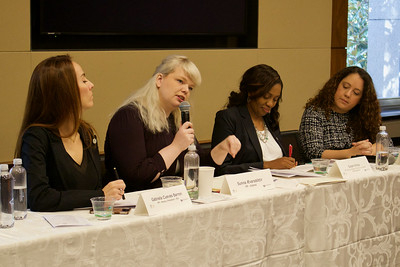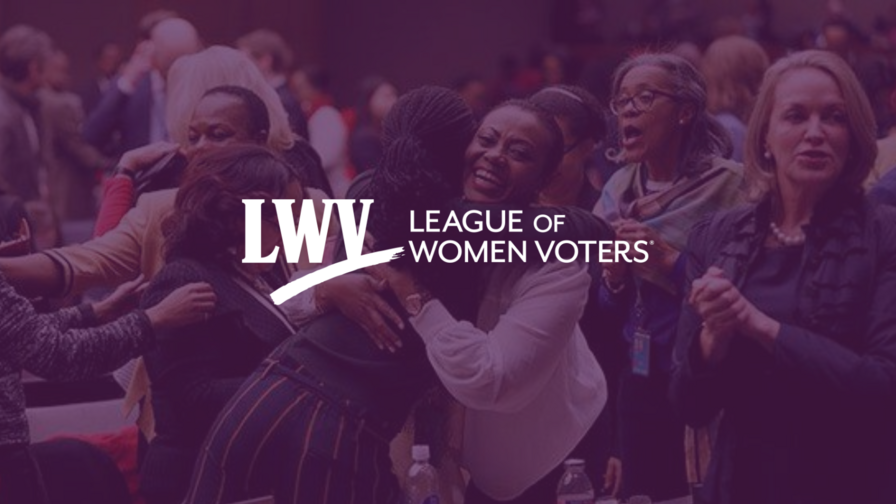My Work as a League Representative at the UN: The Fourth World Conference on Women
This blog was written by Doris Schapira, former chief observer for LWV's UN Observer Group
Little did I know when I agreed to represent the League of Women Voters of the United States (LWVUS) at the United Nations (UN) that it would be such a fulfilling 20 years.
One of my primary memories that sticks with me is our work for the Beijing Women’s Conference, a conference convened by the UN in 1995 to achieve global gender equality.
The Relationship Between the League of Women Voters and the United Nations
The League of Women Voters has a long history with the United Nations. In 1944, LWV lobbied the American public to advocate for the UN’s creation, training people to speak on its behalf and distributing over one million resources.

A Panel on Capitol Hill Hosted by the LWV UN Observer Group
At the UN’s charter conference in 1945, President Harry Truman invited the League to serve as consultants to the US delegation. Since then, LWV has continued its presence through its “observers” (UN-affiliated NGOs and civil societies who may participate in UN General Assembly work and the work of the Economic and Social Council and its agencies).
Review the League’s History with the UN here.
The Working Group on Girls and the Beijing Women’s Conference
When I became a representative in the early 1990s, one of LWV’s priorities was protecting children at risk. My work aligned with this focus; a significant portion of my role, for which I spent 60+ hours a week, centered on forming the Working Group on Girls (WGG), which my League colleague, Margery Cohen, and I helped found.
We formed WGG to lobby government representatives at UN Conferences to include the many unique problems girls face in their documents. This included ways to improve girls’ lives and pledges to do so. As WGG grew, it took on other ways to help girls.
Get involved in the issues that matter to you by joining one of the 700+ state and local Leagues.
Our early work was on the Beijing Women’s Conference preparatory meetings. In addition to lobbying the delegates to add wording about girls (and not just adult women) in the document, we held regular caucuses. Luckily, several NGO representatives from across Africa decided that their representatives would also emphasize the girl child in their lobbying. We worked together in our efforts, which made them more impactful.
As a result of these efforts, the Beijing delegates decided to add the girl child as a critical area of focus. Previously, the unique problems of girls had never been considered.
The Conference, attended on behalf of LWV by Observer Margery Cohen and two board members, resulted in what has been called “the most progressive blueprint ever for advancing women’s rights,” from the Beijing Declaration and Platform for Action. I remain proud that our efforts led to the unique needs of girls being included in this document, which is still used by those striving towards a more equal world.
The Beijing Women’s Conference was just one of many events I and my fellow League members could participate in. To read more stories about past, current, and future advocacy, check out:
-
Paulette Austin’s blog about her experience and LWV Observers’ work with the Commission on the Status of Women, the NGO Committee on Social Development, and climate action
-
This piece on women, girls, and climate change as discussed at the most recent Climate Change Conference (COP27)
-
Our recent blog on supporting girls worldwide
The Latest from the League
League members recently attended the United Nation's 58th Commission on the Status of Women. Following World War II, the League of Women Voters helped lead the effort to establish the United Nations.
Since its Founding in 1945, the United Nations (UN) has played a role in advancing international peace and harmony. The League of Women Voters (LWV) has had “Observer” status at the UN from it’s the UN’s 1945 inception, since major LWV goals such as improving governance and the rights of women are inextricably linked to the security and well-being of peoples everywhere.
This blog explores UN Observer Paulette Austin's experience promoting equality within and without the US.
In November 2022, the League sent delegates in person and virtually to observe the COP27 Climate Change Conference in Sharm El-Sheikh, Egypt. Experts highlighted ways in which climate change disproportionately affects women and girls, who are insufficiently represented in climate change response decision-making.
Sign Up For Email
Keep up with the League. Receive emails to your inbox!
Donate to support our work
to empower voters and defend democracy.





